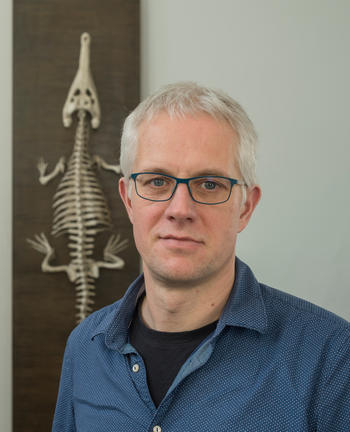Prof. Dr. Jens Rolff

Rolff Group
Institute of Biology - Zoology
Freie Universität Berlin
Professor
Evolutionary Biology
Raum 104
14195 Berlin
Lea Otte
Sprechstunde
Tue 09.30 - 10.30 h
| 2012 | Professor, Free University Berlin. |
| 2003 - 2011 | NERC Research Fellow, Lecturer, Senior Lecturer University of Sheffield, UK |
| 2001 - 2003 | Marie Curie Research Fellow, University of Sheffield, UK |
| 2000 - 2001 | Postdoctoral research fellowship (DFG), Technische Universitaet Braunschweig, Germany and University of Sheffield, UK |
| 1999 | Postdoctoral research associate, Centre for Population Biology, Imperial College at Silwood Park, UK |
| 1999 | PhD, Technische Universitaet Braunschweig, Germany |
| 1996 | Diploma in Biology, Technische Universitaet Braunschweig, Germany |
In our lab we focus on three main topics (please see also the pages of individual members for more details and additional research):
The evolution of insect immune defenses
The evolution of bacterial resistance against antimicrobial peptides and other antimicrobials
Evolution of complete metamorphosis in insects
The evolution of insect immune defenses
The main questions we are asking are: (a) how do insects prevent the evolution of bacterial resistance against antimicrobial peptides as main effectors of their immune defenses? (b) Why is it adaptive for insects to exhibit long lasting costly immune responses? (c) What is the combined effect of immune effectors? (d) How to the host immune system and the microbiota interact during an infection by bacterial pathogens? We use mostly the beetle Tenebrio molitor and the wax moth Galleria mellonella to examine these questions. Studying these questions allows insights into the evolution of complex immune defenses. It also can serve as an inspiration to study applied problems such as antimicrobial resistance in bacteria.
The evolution of bacterial resistance against antimicrobial peptides and other antimicrobials
This research takes a novel approach to understand the evolution of drug resistance in pathogens, one of the most important applied evolutionary questions of our times. We study the effects of AMPs and their combinations on the dynamics of resistance evolution of bacteria. We use experimental evolution to select for resistance and apply genomics to identify the resulting resistance mutations. In collaboration with the group of Roland Regoes we use modelling approaches based on pharmacodynamic models to investigate this further. Also, we study the effect of sublethal antimicrobial exposure on the induction of phenotypic resistance and if and how this leads to the evolution of antimicrobial resistance.
Our most applied project with an interdisciplinary group of researchers studies if experimental forecasting of antimicrobial resistance is feasible. We are aiming to establish a process to make forecasting a practical tool to fight AMR.
Evolution of complete metamorphosis in insects
Most animal species are insects and most insects are holometabolous: they have a pupal stage during development. Complete metamorphosis, re-arranging the whole body during the pupal stage, happens in the vast majority of insects. One main problem insects face during metamorphosis is related to their gut flora. If the gut flora would be released into the haemolymph the hosts would die of septic shock. If the host kills of the gut flora completely before metamorphosis, they would have difficulties to acquire the required gut flora from the environment.
A second hypothesis for the evolution of complete metamorphosis we are studying comes from the observation of a trade-off between growth and differentiation. An organism that grows fast pays a cost of compromising differentiation of the tissues. We ask whether this could be a driver for the evolution of complete metamorphosis where differentiation of adult organs is mostly limited to the pupal stage.
